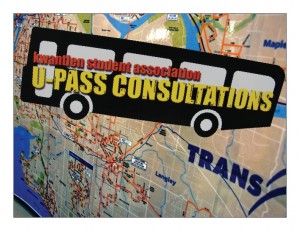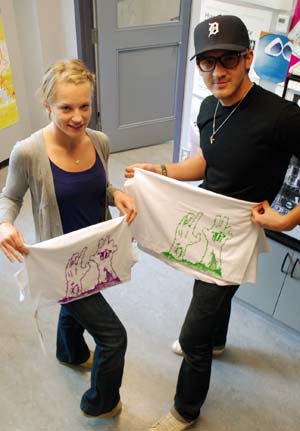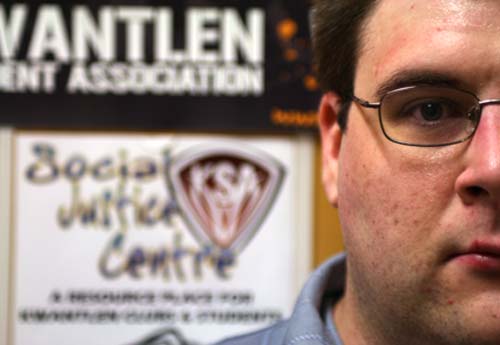KSA collecting students’ thoughts on U-Pass
October 29, 2009 by Kyle Vinoly · 5 Comments

This week a series of U-Pass consultations wrapped up on the Richmond campus. The KSA will return to Richmond next week for another round, eventually concluding in Cloverdale and Langley. (Kyle Vinoy photo)
The Kwantlen Student Association has been touring Kwantlen campuses hosting U-Pass consultations designed to give the KSA a better idea of improvements students would like to see made to transit in order to ease their commute, and to gauge the level of support for a U-Pass.
“We want to make sure that commuting between campuses isn’t the reason students don’t take a course,” said Derek Robertson, director of external affairs.
This week’s series wrapped up yesterday at the Richmond campus, with a return scheduled for next Tuesday afternoon at 2:15 pm in room 1420. Consultations has concluded at the Surrey and Langley campuses, with consultations at Cloverdale scheduled for next week.
At each sessions students are given an 11-page survey which explores their current transit use and improvements they’d like to see Translink make to its service. Robertson said that improving the current level of transit availability and frequency for the Cloverdale and Langley campuses is crucial to the KSA accepting any form of the U-Pass. He also wants to see more recognition payed to Kwantlen by renaming the Landsdowe station on the Canada Line to include the school’s name.
Robertson does not support a $25 U-Pass being pushed by OnePassNow as he feels supporting it would mean Kwantlen students would subsidize students at other colleges, such as Emily Carr and VCC-Clark. He said that those two schools combined have roughly 10,000 students and Kwantlen has 15,000 and that difference would equal an unfair price tag for Kwantlen students. He said that Kwantlen students could hope for a pass costing between $25 to $30 without partnering with other universities.
After all the data from the consultations is complied, Robertson plans to meet with Translink and the provincial government and come to an agreement. He will be in Ottawa next month to present the data and hopes to arrange a meeting with federal transport minister John Baird.
Robertson’s goal is to hold a referendum on the U-Pass in the KSA general election this spring.
Where have all the computers gone?
October 26, 2009 by Kristi Jut · 1 Comment
When Kwantlen journalism students came back to school in September, 26 four-year-old Apple computers had been replaced in their lab, as well as six in a production rooms reserved specifically for students in the program.
Students didn’t only want to know why the computers had been replaced, they wanted to know where the old computers went, and whether they could get their hands on them.
The answer is maybe.
Juilien Phillips, Graphic Design and Marketing systems supervisor, who worked closely with the Journalism program, told The Chronicle that all of the university’s computers need to be upgraded to newer versions every four years. “[The older computers] would not be able to manage the software we put on them [this year],” he added.
Some computers get distributed throughout the university, where even older versions need upgrades, and the other are put into storage.
That’s where Scott Gowen,, Kwantlen’s Director of Supply and Business Service, comes in. When the computers are put into storage, Gowen is notified. He then liaises between Kwantlen’s IET Department and the B.C. Government’s Asset Investment Recovery (AIR).
Because Kwantlen has a policy that prevents sale of surplus equipment to faculty, staff and students, the unneeded computers have to go to B.C. AIR, or are donated to Afretech, Gowen said. Afretech is an organization based in Delta that was started by two Kwantlen instructors. Its purpose is to collect surplus supplies from places that no longer needed them, including Kwantlen, and donate them to schools in rural Africa.
Gowen is letting students in on a little secret.
“This November ,another shipment of Mac computers will be sent to B.C. AIR where they will be available for purchase by any member of the public, including Kwantlen employees and students,” he wrote.
The company, which deals with a cash-and-carry program as well as online-auctioning, is offering a “special back-to-school deal on laptops and computers.” The surplus equipment is available at B.C. AIR warehouses (located in Surrey, Victoria, and Prince George) or through their online auctions.
Information on cash and carry sales and auctions are available at the B.C. AIR website.
Kwantlen on B.C.’s Top 55 Employers list again
October 26, 2009 by Kirk Darbyshire · Leave a Comment
Kwantlen Polytechnic University has again been chosen one of British Columbia’s top 55 employers for 2010.
“This is a testament to all those who worked hard not only for the students, but also on behalf of their colleagues,†wrote David Atkinson, president and vice-vhancellor of Kwantlen, in an online announcement.
The annual competition is in its sixth year, and is organized by the editors of Canada’s Top 100 Employers. This is the third time Kwantlen has been selected on the list.
The competition is open to employers of any size, as long as their head office or principle place of business is in BC. Employers in both the private and public sectors are eligible.
The competition looks at the same eight criteria used by its national counterpart:
- physical workplace
- work and social atmosphere
- health, financial and family benefits
- vacation and time off
- employee communications
- performance management
- training and skills development
- community involvement
Kwantlen, which is one of four universities on the 2010 list, was selected for its work in many areas. The university was recognized for new mothers maternity leave top-up benefits to 75 per cent of their salary for 52 weeks. Kwantlen also pays parental leave top-up benefits to 75 per cent for 37 weeks for new fathers or adoptive parents. Both exceed what employment insurance entitles workers to.
Another criteria that sets the university apart was vacation and time off. Kwantlen gives all new employees three weeks of paid vacation time during their first year on the job.
The university also helps employees balance work and personal lives through a variety of alternative work arrangements. Examples include telecommuting, which means employees enjoy flexibility in working location and work hours, and giving employees a 35-hour work week, with full pay and full company-paid health benefits.
Design students raising money for grad show
October 22, 2009 by Jacob Zinn · 1 Comment

Heather Hastings and Andrew Passas display t-shirts sold Tuesday in Richmond. (Jacob Zinn photo)
Fourth-year graphic design students have taken their first steps to raise the money they’ll need for their graduation show.
“Basically, we have to raise, as a class, between $15,000 and $20,000,†said Andrew Passas of the Graphic Design for Marketing (GDMA) program, who estimated that about $2,000 has been raised so far.
Design classmate Alexa Lupul added, “We’re collecting bottles and doing all that kind of stuff to help the program, so we’re still at the very beginning stages of our money findings.â€
On Tuesday, students sold Halloween-themed t-shirts at the Richmond Campus for $20 each, though sales were slow.
“Some of us have printed t-shirts,†said Passas. “Others have baked cupcakes, and another group has done agendas, calendars and books.â€
The graphic design program is planning fundraisers throughout the year, including pub nights and bake sales.
Artwork sales will focus on holidays such as Christmas, Valentine’s Day and Easter. The money will help meet the expenses of the year-end exhibition of graphic design work, scheduled for May or June.
For more information on the graphic design program’s fundraisers, visit the GDMA’s blog.
Kwantlen student wins Jack Webster journalism award
October 21, 2009 by Katie Lawrence · Leave a Comment

Emcee Chris Gailus of Global TV welcomes the crowd to the 23rd annual Jack Webster Awards.
Third-year Kwantlen journalism student Christopher Sun was one of the seven winners of Jack Webster Foundation Student Journalism Awards, presented at the foundation’s dinner Tuesday, Oct. 20.
Kwantlen’s journalism program was well-represented by 25 students, who attended the dinner held at the Westin Bayshore downtown.
Other student winners included Trevor Crawley and Leasa Hachey from Langara College, Jenny Fremlin from Thompson Rivers University, Leia Hutchings and Jacob Barker from BCIT and Cecilia Geryson from UBC.
The 25 students from Kwantlen were joined by almost 1,000 others who attended the dinner and saw some of B.C.’s best journalists given credit for their work.
The event, emceed by Global TV’s Chris Gailus, drew big names. CBC sportscaster Brian Williams was the keynote speaker; Bill Good of CTV and CKNW won the Bill Hutchinson Lifetime Achievement Award; and Les Leyne of the Victoria Times-Colonist won the City Mike Award for Commentator of the Year.
CBC was the big winner with five awards, including Best News Reporting of the Year – Television and Best News Reporting of the Year – Radio. The Vancouver Sun took home three awards and the Globe and Mail, CTV, Kamloops This Week and Fairchild TV each won one.
Diwali comes to Kwantlen
October 21, 2009 by Kristi Jut · Leave a Comment

Rina Bali and Nicole Joe dress in traditional indian garb to celebrate Diwali. (Kristi Jut photo)
Kwantlen’s Richmond campus held the Diwali festival in the rotunda on Thursday, Oct. 15.
Diwali, which is most commonly known as the festival of lights, is celebrated by several Indian religions. It is usually colourful and sometimes incorporates fireworks and gift-giving.
KSA members and Human Resources students Nicole Joe and Rina Bali were just two of several volunteers giving out free samosas and bundi, a dough and sugar based Indian candy at the Richmond celebration.
“For some calendars [Diwali] also starts out a new year,” said Bali.
But why is it important for Kwantlen, specifically, to hold a Diwali celebration? “It’s a good way to increase ethnic diversity on campus,” said Bali, “and it creates awareness [about Diwali].”

Bundi is a dough and sugar based sweet from India (Kristi Jut photo)
Getting around at Winter Olympic time
October 20, 2009 by mark · Leave a Comment
Reporter Justin Langille wanted to know how Kwantlen students feel about how they’ll get around the city in February when the Winter Olympics hit Vancouver. Here’s an audio slideshow that shows what some of them are thinking and planning:
Liaison quits KSA over social justice spending decision
October 20, 2009 by Mitch Thompson · 4 Comments

Ken McIntyre has resigned as a student liaison after a KSA decision over an referendum-approved charge for a Social Justice fund. (Mitch Thompson photo)
Student liaison Ken McIntyre has resigned from his position on the Kwantlen Student Association council to protest the handling of a referendum-approved 10-cents-a-credit fee to fund the Social Justice Centre.
McIntyre, who had been the liaison to the KSA for students with disabilities, one of seven positions that focus on social justice issues at the university, resigned Oct. 6 after the KSA voted to remove the 10-cent-a-credit fee from Social Justice and increase the KSA’s building fee from 25 cents a credit to 35 cents.
The social justice fee was approved in the September referendum and would have been used to fund the liaisons and their Social Justice Centre, rather than having their budget come from KSA operating funds.
Derek Robertson, director of external affairs, made the motion to remove the Social Justice fee and increase the student union building fee instead.
“His rationale was that we still had a budget for the previous year, even though it was taken out of the KSA operating expenses,†said McIntyre.
Because of the KSA’s self-imposed student-fee-increase limit of 15 per cent (or $1.56 for next year) a year, the KSA council would be unable to introduce the social justice fee as well as raise the building fee.
McIntyre fears that removing the fee would mean there is no guarantee that social justice will receive adequate funding next year.
“Any other proposal that was put forward by myself or somebody else was, basically, swiftly voted down by [Robertson] and the council,†he said.
The motion was passed and McIntyre decided to leave the KSA in protest. “[Social justice is] more or less one of their bottom issues that they pay lip service to,†he said.
A representative for the KSA said priorizing played an important role in the choosing of which of the fees approved by students would be implemented.
“When we put these questions forward, we didn’t think they would all pass,†said Nathan Griffiths, director of operations.
All of the fees, save one CFS-related one, were passed, and the KSA was faced with the problem of deciding who receives money first while staying under the 15 per cent cap on student fee increases.
“Largely, more people voted for the student union building than people voted for social justice,†Griffiths said.
The referendum results released by the KSA show 58.5 per cent of voters were in favour of the student union building fee and 52.6 per cent of voters were in favour of the social justice fee.
One of the considerations for the KSA is the large mortgage on Surrey campus’s G-building.
The building — which currently houses the KSA, the gymnasium and Grassroots café, other facilities and classroomsz — was built in the 1990s. The provincial government had refused to pay for anything that wasn’t a classroom, so the KSA held a referendum and raised the $1.8 million dollars needed for the other rooms.
The KSA has been paying a sizable mortgage since, and needs to pay it off before it can begin constructing a new student union building.
“We’ve got to pay the mortgage,†said Griffiths. “I don’t think we’d look bad for paying the mortgage.â€
Robertson echoed Griffiths’ position, saying that he felt it would be better to pay off the mortgage more quickly, rather than having the 10 cents a credit go to social justice.
“This was not an attack on our liaisons. This was not an attack on social justice at Kwantlen,†he said. “The whole argument that the KSA is underfunding liaisons is just not true.â€
Robertson said that the KSA provides funding for social justice but sees little of that money being used. “Every single year, the KSA puts money towards the Social Justice Centre and liaisons, and every single year a majority of it is not spent,†he said.
For Griffiths, this is enough to make him reconsider sending more money to social justice. “More money doesn’t necessarily equal more social justice,†he said.
McIntyre explained the lack of spending is a result of the culture towards social justice within the student association. He said that the unused funds come from vacant liaison positions or are the result of provisions that state only a certain percentage of money can be spent at one time.
He also said that many liaisons don’t focus on large scale, high-expense events, as “the amount of money that’s available, with the lack of cooperation and manpower from the rest of the society, sometimes doesn’t make it worth doing.â€
According to McIntyre, indifference towards social justice extends past a lack of funding and into where the liaisons actually work.
The possibility of turning the Social Justice Centre into extra office space for KSA staff, and instead issuing liaisons low-end laptops on which to work, has been discussed among members. The belief was that since the liaisons are multi-campus positions, making their workplace mobile was a natural step.
McIntyre countered however, saying that the KSA executive are technically multi-campus positions as well, but receive both office space and laptops.
“It’s adding insult to injury, as far as I’m concerned,†he said.
“I still believe that the student association is good for the students at Kwantlen,†said McIntyre. “As far as social justice issues, I have lost faith in the student association to make any headway.â€
Robertson said that he will fight to make sure social justice gets the same funding as last year, but McIntyre wasn’t impressed.
“Guaranteeing funding for the amount of money we got last year is a good first step,†he said. “But, at the same time, if you take a look at other students unions, and what they have for social justice, it’s going to take more than just an empty promise.â€
KSA terms referendum results ‘historic’
October 20, 2009 by Sarah Jackson · 1 Comment
Twelve of the 13 items on this September’s referendum ballot were approved, a result that the Kwantlen Student Association, who planned the referendum, never foresaw.
Student fees will increase $1.56 per credit for the spring, summer and fall 2010 semesters to fund the creation of student union buildings, the START volunteer program, the REBOOT computer service, intramurals and clubs and events. This means that full-time students registering for 15 credits should expect their spring semester bill to be $23.40 higher.
The KSA plans to begin START, REBOOT and intramural programs in January and is discussing holding a referendum asking students for permission to raise student fees more than 15 per cent per year to hasten the introduction of other items that were approved.
“This is quite historic,†said Steven Lee, director of finance for the KSA. “The KSA wasn’t expecting all of [the referendum items] to pass. We wanted to see what students wanted us to do, so it was kind of a referendum slash opinion poll.â€
Fees collected for the student union fund will be put toward building planning and paying off the $1.6 million G-building mortgage from the 1990s, which was partially covered through the KSA’s reserve funds last year. The clubs and events fee will be used to offset current clubs and events spending, which totaled over $150,000 last year.
Less than half of one per cent of Kwantlen students voted: 494 ballots were cast, surpassing the 250-minimum required to make referendum results binding.
The turnout was “quite good for a referendum,†said Lee.
The Canadian Federation of Students fee increase, the only item that failed, will not affect Kwantlen’s CFS membership. The proposed increase was questioned by Shamus Reid, chairperson of the CFS-BC, as an amount he was not familiar with and something that would not normally appear on a referendum ballot.
“I don’t know where that number came from,†he said.
Desmond Rodenbour, general manager of the KSA, said that the CFS adjusts membership fees for inflation every year and that the KSA reached the $1.78 fee increase by calculating the CFS’ percentage increase.
After consulting the University Act and the College and Institute Act, the KSA determined that it has “no legal authority to increase student fees without a referendum,†said Rodenbour.
Lee believes the item failed because “the students that voted are already familiar with the KSA, so they know how the CFS has been treating the KSA.†Everything else passed because “we were able to get different people [campaigning] that were interested in different areas.â€
KSA takes CFS-BC feud to B.C. Supreme Court
October 18, 2009 by Sarah Jackson · 4 Comments
One-and-a-half years of bad blood between the Kwantlen Student Association and the Canadian Federation of Students, B.C. Component are about to culminate in a court battle set for Oct. 29 – 30.
The KSA filed a court petition with B.C. Supreme Court in June to settle a dispute over the CFS-BC’s refusal to ratify Kwantlen’s elected CFS-BC representative in May 2008.
“Now we find ourselves going to court, but I’m not sure why,†said Shamus Reid, chairperson for the CFS-BC.
The CFS-BC did not ratify the nomination to appoint Derek Robertson, Kwantlen’s elected director of external affairs and ex-officio representative for the CFS-BC, to the executive committee because of “actions that he took to deliberately undermine the CFS-BC,†said Reid.
“That individual was unfit as a director. The executive committee felt he couldn’t uphold his responsibilities as a director.â€
The CFS-BC suggested, prior to court proceedings, that the KSA nominate a different individual to the executive committee. “The KSA has always had the opportunity to appoint another representative to the CFS,†said Reid.
Robertson said the KSA appealed to the courts for acknowledgement that the CFS-BC has no authority to disallow a member student body’s elected representative from joining the executive committee. Doing so would set a precedent avoiding future ratification disputes and would place Robertson on the committee.
“I’m not always just another CFS voice,†he said. “At times I have been very critical of the organization, and I feel that the organization could be doing a much better job.â€
Robertson was a member of the CFS-BC executive committee until he resigned in February 2008 prior to a Kwantlen referendum on CFS membership. “I did not feel that I could be faithful to both organizations so I did the right thing and resigned,†he said.
After resigning, Robertson campaigned to convince students to vote against continued CFS membership. Reid said Robertson “was not forthright about his participation in a campaign to undermine the federation.†Documents that show Robertson joining anti-CFS Facebook groups before his resignation are under consideration by the B.C. Supreme Court. Following the referendum, which reaffirmed Kwantlen’s CFS membership, Robertson was re-elected and re-nominated as the CFS representative according to procedures guided by CFS bylaws but was not ratified by the executive committee, which is made up mostly by representatives from other B.C. post-secondary institutions.
The nomination and ratification processes are guided by provisions in the Societies Act and in CFS bylaws, which are being pitted against each other in the court case. While the Societies Act states that a director must act honestly and in a fitting manner, Desmond Rodenbour, general manager of the KSA, said this does not permit an organization to disqualify a person from a board of directors position if they believe someone does not have those qualities. A CFS bylaw states that the provincial executive representative shall be determined in a manner consistent with the bylaws of the local student association.
“The problem is that the CFS is somewhat secretive and chooses not to publicly post many of their internal documents,†said Rodenbour, a sentiment that Robertson shares.
“Frankly, it’s absurd for the CFS to climb in and say, ‘Well yes, there’s a process, but there’s also another process which we’re not gonna tell you about,’†said Robertson.
Rodenbour doesn’t want to elect another person to the position, calling it an issue of principle. “If they honestly believe they’ll work best only with people that they’ll agree with, they’re missing the point of democracy… If you only want one viewpoint, you can do that with one person.â€
The court petition, filed during the university’s summer session, has not been revealed to students through public announcements from either organization. But Kwantlen students will be paying legal fees for both sides of the battle.
Rodenbour said legal fees could range from $10,000 to $25,000, “a very reasonable cost to have the petition resolved†when compared to the $150,000 turned over to the CFS every year.
Robertson agreed, saying, “The funny thing about this case is that Kwantlen students are being charged twice, because they’re getting charged once for legal fees with the KSA and they’re also being charged through membership dues to the CFS, which are going to this case.â€
CFS membership benefits during the period without representation are questionable, according to Rodenbour, who likened the fight to the United States’ taxation without representation battle cry.
The CFS-BC is a liaison between B.C. post-secondary institutions and the government and lobbies for benefits including the reduction of tuition fees and student debt. “The CFS continues to work on issues that Kwantlen has identified as priorities,†said Reid. “Kwantlen students have given very clear direction that they want to work with other student unions all across Canada… I’m fairly mystified as to why the board of the KSA chose to [petition the court].â€
Meanwhile, signatures are being collected at Kwantlen campuses to call for another referendum giving students the option to defederate from the CFS this April, when the required two-year period following CFS membership referendums has ended.


